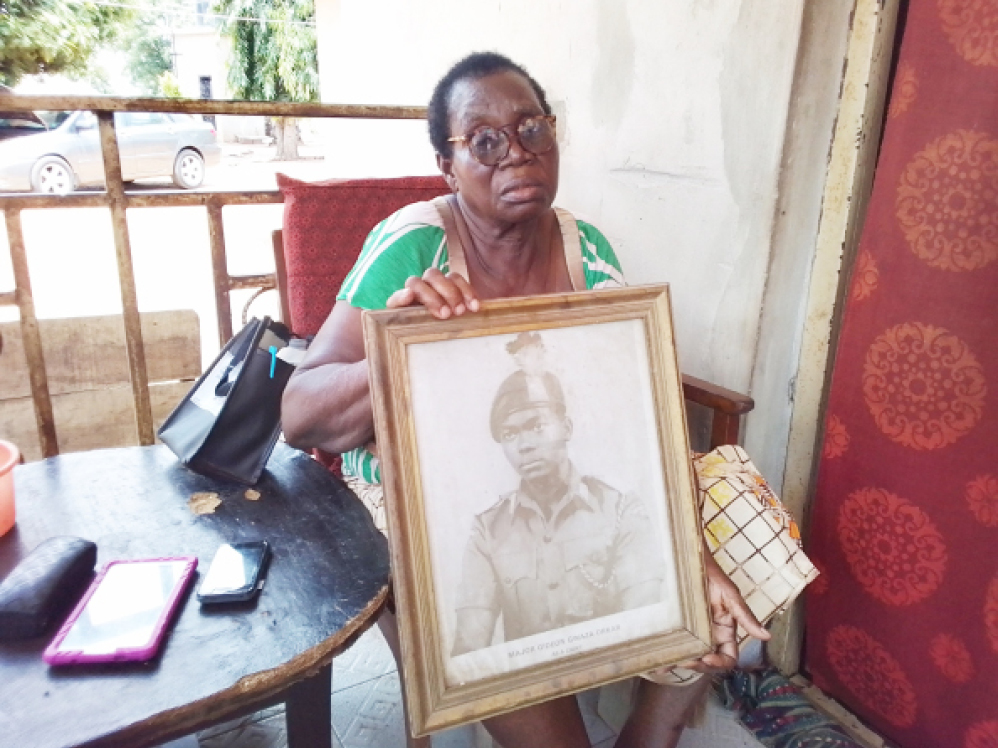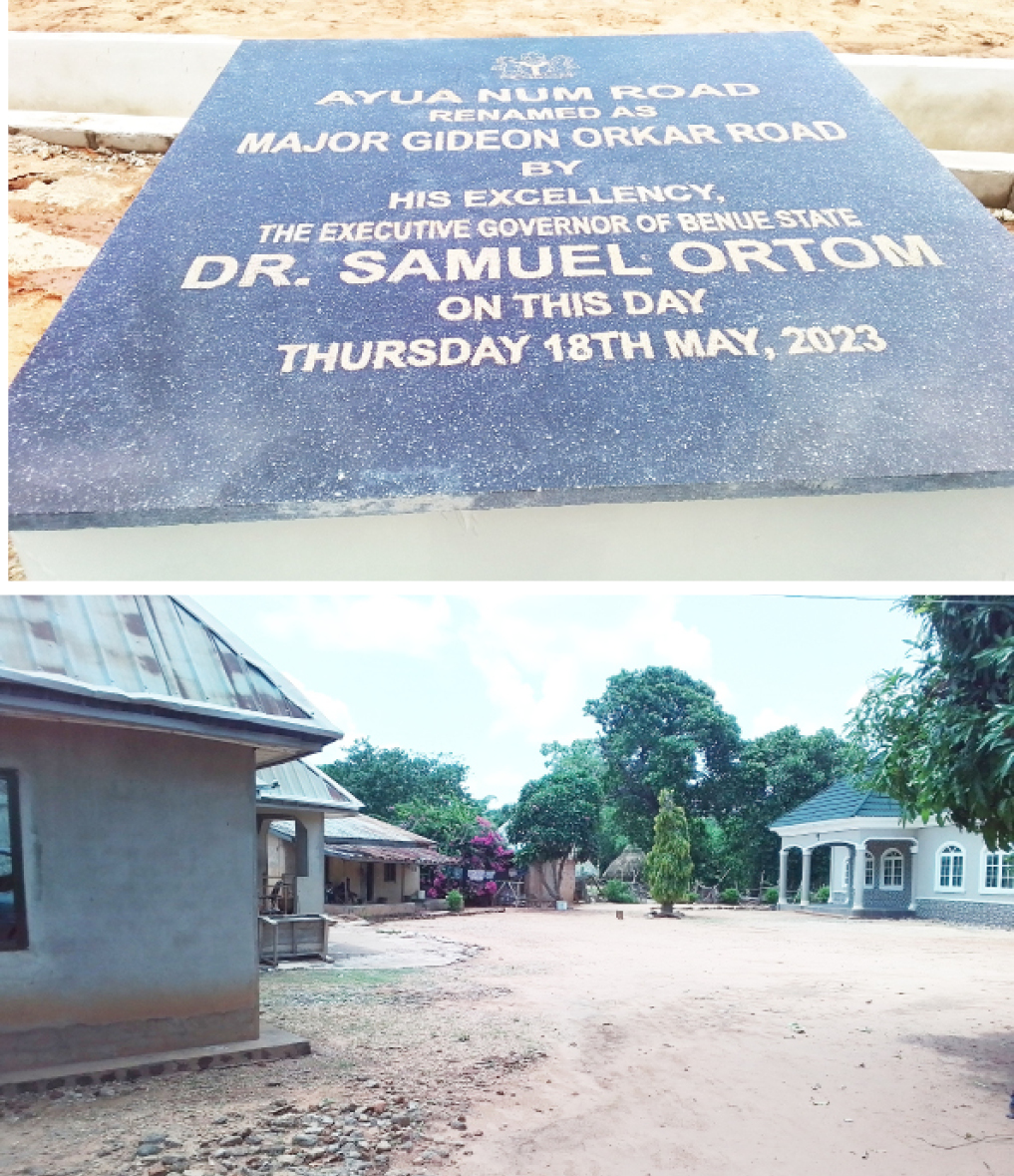Who is Major Gideon Orkar?
Undoubtedly, the name Major Gideon Orkar invokes different memories for residents of Benue State when mentioned among people of Orkar village in Mba-Agi, a suburb on the outskirts of Makurdi, the state capital. The late military officer, Gideon Orkar, was executed over a failed coup on July 27, 1990. He was a Nigerian military officer […]

Mama Tabitha
Undoubtedly, the name Major Gideon Orkar invokes different memories for residents of Benue State when mentioned among people of Orkar village in Mba-Agi, a suburb on the outskirts of Makurdi, the state capital.
The late military officer, Gideon Orkar, was executed over a failed coup on July 27, 1990. He was a Nigerian military officer convicted for a violent coup against the government of General Ibrahim Babaginda.
Our correspondent reports that nearly 33 years after, some young fellows even in the deceased soldier’s home town are ignorant about who he was while majority of the older ones, especially his family members, recalled fond memories of their own felled on conviction of treason.
His memories were, however, rekindled with the honour bequeathed him by the Benue State Government.
- How vigilantes killed 11 herders, women, children in Oyo community
- 6 top sectors awaiting Tinubu’s ‘magic wand’
Indeed, the people of Mba-Agi community in Makurdi Local Government Area of Benue State are excited over the honour in renaming of the newly constructed 9.7km Terwase Agbadu-Tse-Poor-Apir road after the late Major Gideon Orkar by the Governor Samuel Ortom-led state government.
Ortom had on Thursday immortalised Major Gideon Orkar by renaming the 9.7km road which links communities around Apir, including Mba-Agi to Terwase Agbadu junction, after the deceased soldier in an elaborate ceremony which also heralded the commissioning of a health facility in the area.
The road was earlier named after the first speaker of the State House of Assembly, Ayua Anum, in November last year when it was commissioned by River State Governor, Nyesom Wike.
But, with the latest development, the governor also on Thursday commissioned a 14km Mobile Barracks-Welfare Quarters Road and instead named it after the first speaker, Ayua Num, while the former was changed to Gideon Orkar road.

Ortom stated at the renaming ceremony that it was a decision of the State Executive Council that the late army officer who stood for the cause of justice, equity and fairness in the country but was unfortunately executed by the military junta after a failed coup for his patriotism be immortalised.
An elder brother of the deceased army officer, Prof. Kpamor Orkar, who graced the occasion on behalf of the Orkar family, expressed appreciation to the governor and the Benue State Government for immortalising a member of their family.
When our correspondent traced the home of the late Orkar, his foster mother, Mama Tabitha Nyishor Orkar, went down memory lane to narrate how much the deceased was loved and how they (family) would never forget him.
Mama, a retired teacher, recalled that her husband (Gideon’s brother) was the third of 12 children in Orkar’s lineage while the deceased military was the ninth and spent his formative years with her, having lost his biological mother quite early in life.
“Gideon was in primary four when we (she and her late husband) carried him to Mkar where he finished his primary and secondary education. He then went to the Academy (Nigerian Defence Academy) in Kaduna and trained himself,” Mama said.
She narrated further that before he completed the academy, his brother, who was her husband, died.
She added that the late Gideon went on to join the military and continued his career until the event leading to his unfortunate death.
The elderly woman, who said the deceased soldier was more of a son she nurtured, explained that no day passes by without her or other members of the family remembering Gideon whom the fondly called by his native name, Gwaza.
“He was such an intelligent boy whom while growing up always aspired to become someone who can right wrongs. His brother who was my husband initially didn’t want him to join the military. He was outspoken. Until date, whenever certain things happens in the family, we will say, if Gwaza were alive, such wouldn’t have happened.
“We always remember him in our minds. Everyday and even today, I have carried his picture (a portrait, she even went into the parlour to bring outside) and said, Gideon, my son we love you but you left too early. We miss him; I missed him so much because he stayed with me for a very long time. He came to me early in life and went for NDA in Kaduna.
“We love the honour done him. The road which passes through our village is a good memory of him. He was hard-working, strong and good. Everybody in this community love him and talk about him time to time,” Mama said.
Similarly, another family member, Euphemia Adurough, said the late military officer was the pride of Orkar village whose life was cut short.
Adurough, who said she was part of the Orkar’s family by marriage, appreciated the road renamed after the deceased, stressing however that it was a deserving honour in his loving memory.
In the same vein, Saarwaun Ikedh, a resident of Orkar village, hailed the decision of Ortom’s administration to rename the road after Gideon whom the villagers recognised as their hero.
However, a young man, simply known as Terwase, told our correspondent along the Gideon Orkar road that he did know whom the person was and why the road was renamed after him.
Also, a teenager, Blessing Jerry, wondered who Gideon Orkar was because she never knew anything about him.
But, an Air Force officer sighted walking along the fenced NAF Base from the Ugondo axis, said he was too young to know much about the late military officer except what he read and was taught on the failed coup.
Uchechi, a 50 year-old resident, expressed excitement when asked about Gideon Orkar, noting that he followed the trends of event when it happened in 1990.
For Terhemen, Pev, a resident of Mbaikya, a village next to Mba-Agi, “I know much about the late Gideon Orkar. He’s from a large family in the village after ours. Though, I’m young but I know he was killed after a failed coup. I’m happy the road is named after him so that his memory will be preserved for generations yet unborn.”
A retired soldier, who preferred anonymity, said Nigeria would have been better if Orkar’s coup had succeeded.
“It was quite a violent coup. What Gideon Orkar stood for at the time was however playing out now,” the old soldier posited.
It would be recalled that the late Major Gideon Gwaza Orkar was born on October 4, 1952. He had staged a coup against the ex-Military Head of State, General Ibrahim Babangida on April 22, 1990 alongside his conspirators who seized the Federal Radio Cooperation of Nigeria (FRCN) radio station, various military posts around Lagos and the Dodan Barracks, Lagos, the military headquarters and presidential villa.
Orkar had, in his coup address, called for the excision of five northern states. But Babangida, who was said to be present when the barracks were attacked, managed to escape unhurt.
To this end, Orkar including 41 other coconspirators were tried, convicted of treason and were executed by firing squad on July 27, 1990.
The late military officer had part of his secondary education in Plateau State and while taking Higher School Certificate classes, he responded to an army advertisement and joined the Nigerian Army in 1972 as cadet no 682. He started his officer cadet training at the Nigerian Defence Academy, Kaduna with the 12th Regular Combatant Course.
Orkar was commissioned in December 1974 in the rank of Second Lieutenant and posted to the Nigerian Army Armoured Corps School in Ibadan and served in various units including the Reece at Kaduna, 82, Div, Enugu, and Armoured School, Bauchi and until his last posting prior to the April 1990 coup was as a member of the Directing Staff of the Command and Staff College, Jaji.
